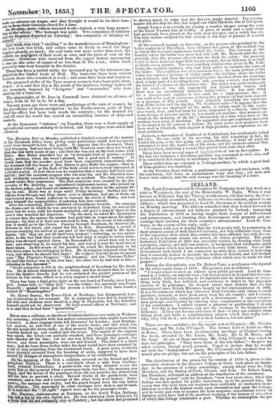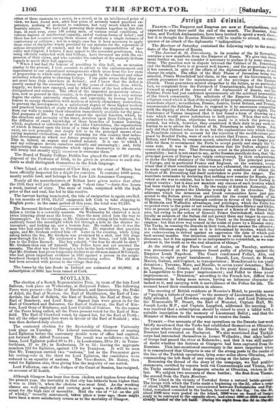IRELAND.
The Lord-Lieutenant and the Countess St. Germans Went last week on a visit to Woodstock, the seat of the Honourable W. Tighe. When it was known at Kilkenny that the Viceroy would return via that town, the Cor- poration hastily assembled, and, with one or two dissentients, agreed to an address; which was presented to Lord St. Germans at the railway station on Monday morning. The address remarked that they looked forward to a degree of advancement not hitherto attained by Ireland; instancing the Exhibition of 1853 as having taught them lessons of self-reliance and perseverance, and trusting that Government will promote and en- courage their resolves for their country's advancement. Lord St. Ger- mans, in the course of his reply, said- " I concur with you in hoping that the Irish people will, by persevering in their present course of well-directed industry, not only obliterate every trace of the calamities with which this country has been afflicted, but will also se- cure, as far as human means can secure, its future prosperity. The great Industrial Exhibition of 1853 has assuredly tended, by showing what Irish enterprise, capital, and skill can achieve, to invigorate that wholesome spirit of self-reliance which has been awakened in every Irish breast- You do the Government with which I am connected no more than justice in believing that it earnestly desires to promote the welfare of Ireland, and will further to the utmost of its power every judicious effort which may be made for that purpose." Among the dissentients, was Dr. Robert Cane, a gentleman who figured in the serio-comic farce of 1848. His protest was as follows- " I would object to such an address upon public grounds. Lord St. Ger- mans is, I believe, an amiable man ; but he represents in Ireland that Govern- ment which, without referring to its bigotries and its intolerance of every- thing truly Irish, has inflicted, and continues to inflict by the improper exercise of its patronage, the deepest curses upon Ireland that she has encountered since British Ministers bought up her representatives in 1800. It is a Government which has tolerated Irish Catholics only where it could purchase, debauch, or steal them away from the old country; and I cannot, directly or indirectly, compliment such a Government. I cannot compro- mise principle and veracity by uttering false compliments to the corruptors of my countrymeu. I cannot express a pleasure or gratification I do not feel. But this is my business, sad not the business of the Corporation of Kilkenny. If they can become oblivious of that—if they can consider these things good, and write a complimentary reaffirms which they really feel— why, they will do it ; and then it is their business, but not mine."
There are two candidates for the vacant seat at Clonmel,—Mr. Charles Bianconi, and Mr. John O'Connell. The former held or holds an office at Rome. There have been electioneering meetings at Clonmel during the week, attended by Mr. Lucas, Mr. Duffy, Mr. G. II. Moore, and Dr. Gray. At one of these meetings, Mr. John O'Connell was asked to state his principles. "They were those of his late father,"—he gave no other answer, though much pressed. Urged to declare that be would act with the "Independent" party, Mr. O'Connell still repeated that he would give no pledge, but act on the principles of his late father.
The distribution of the prizes for the session of 1853-'4, given to the successful students in the Queen's College at Cork, took place on Satur- day, in the presence of a large assemblage, among whom were the City Members, and the Bishop of Cork, Cloyne, and Ross. Sir Robert Kane, the President, delivered an address at the conclusion of the ceremony. "From the period," said the President, "now four years since, when this College was first opened for public instruction, up to the present time, the young men who have been our students have uniformly so conducted them- selves as to reflect the highest credit upon themselves and upon the College, and to verify and even to surpass the most sanguine expectations which its founders could have had of the practical working of the system of education of whieltthisCollege constitutes a part e Whether we contemplate the pee sition of those students in a social, in a moral, or in an intellectual point of view, we have found now, after four years of severely tested practical ex- ' ce, nothing of moment to condemn, but very much which we can
y admire. We have had pursuing their studies together in this Col- lege, in each year, some 1,50 young men, of various social conditions, of various degrees of intellectual capacity, and of various forms of belief, and there has not occurred among those masses of students a single instance of controversy or collision ; not in a single case has it been necessary to apply those rules of discipline wisely provided by our statutes for the repression of serious irregularity of conduct, and for the higher responsibilities of mo- rality and religion, I believe I may appeal to the reverend gentlemen, who, being officially connected with this College, have favoured me with the ex- pression of their views, and who consider the conduct of the students in those
regards to merit their full approval. • • •
" When I last had the honour of presiding in this hall, on an occasion similar to the present, I took occasion to advert to the embarrassment and impediment to our educational arrangements which arose from the low state of preparation to which only students are brought by the classical and other secondary schools prior to entering College. I am quite aware that they are not more here than elsewhere in Ireland; and I know that the defect is mostly caused by the excessive losses of the years of distress, from which, happily, we have now emerged, and by which some of the best schools were disorganized and reduced. The effect of the imperfect preparatory educa- tion, now so general in this country, is to depress and limit in a very serious degree the entire university standard, and especially, by forcing our Pro- fessors to occupy themselves with matters of merely elementary instruction, to prevent the development in a satisfactory degree of those higher modern And practical branches of study which should enable the students on issuing from our walls to render their education immediately available for the prac- tical purposes of life. For we must regard the special function which, by the structure and necessity of the times, devolves upon those Celle es to be the diffusion of exact knowledge of those branches of human learning, which, neglected or subordinated in the older Universities, the organization of which is framed upon the ideas of a time when those exigencies did not exist, are now generally and deeply felt to be the principal means of se- curing material civilization, and of obtaining for this country that indus- trial development in which our future prosperity must be chiefly sought. This is, indeed, an august and exalted mission. It is one to which I and my colleagues devote ourselves ardently and unceasingly ; and, fully appreciating the various obstacles which oppose themselves to its success,
will firmly and steadilz, to overcome them."
The Board of Trinity College Dublin has placed the sum of 20/. at the .disposal of the Professor of Irish, to be given in premiums to such stu- dents as shall distinguish themselves in the Irish language.
Clare Island, at the entrance of Clew Bay, on the coast of Mayo, has been officially inspected for a depot for convicts. It contains 4000 acres, mostly arable land, and belongs to the Law Life Assurance Company.
Nearly all the manufacturers of Belfast have given notice that after the 28th they will put their mills upon "short time "—forty-five hours a week, instead of sixty. The state of trade, conjoined with the high Trice of flax and coal, has led to this resolve.
The harvest having terminated, the tide of emigration is again swelled. In ten months of 1852, 22,657 emigrants left Cork to take shipping in English ports; in the same period of this year, the total was 33,265.
The Reverend Richard Graham, curate of Meigh, near Newry, has nearly fallen a victim to a cowardly assassin. On Wednesday he observed a man twice loitering about near the house. Once the man asked him the way to Crossmaglen. In the evening, as Mr. Graham was sitting in his bedroom, he suddenly found the moonlight which fell through a hole in the shutter in- tercepted; and looking up, saw a human face. He rushed out—it was the man who had asked the way to Crossmaglen. He repeated that question again, and Mr. Graham ordered him off. Later in the evening, while lying asleep before the fire, Mr. Graham was awakened by a shot, and felt slugs pass through his hat. He awakened a boy in the house, and told him to run to the Police Barrack. The boy refused, "for fear he should be shot." Mr. Graham then ran off himself. The Police have not yet arrested the assassin. The shot was fired through a hole in the back-window. It appears that Mr. Graham had given temporary shelter to an old man named M'Connell, who had given important evidence in 1851 against a person in the neigh- bourhood charged with having issued a threatening notice. The old man had been accosted with groans in the village that day.
The losses by the late floods in Ireland are estimated at 60,0001. A subscription of 8001. has been raised at Cork.



































 Previous page
Previous page